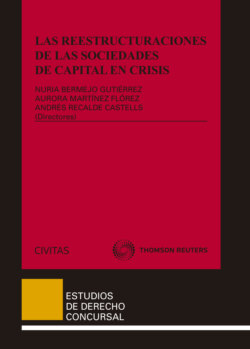Читать книгу Las reestructuraciones de las sociedades de capital en crisis - Aurora Martínez Flórez - Страница 68
На сайте Литреса книга снята с продажи.
VIII. THE SHAREHOLDERS PROTECTION
ОглавлениеFrom articles 163, paragraph 5 and 185, paragraph 6, l.b.l. arise the problem of the appropriate means to protect shareholders position58), examined in depth even in foreign legal systems. The matter is to imagine protection measures not conflicting with the legislative aim of the elimination of shareholders veto power59).
Italian insolvency law rules do not recognize shareholders right to vote for the approval of the crisis solution60).
It can however be argued that, as well as in Germany where shareholders have the right to file opposition against the confirmation by the court of theInsolvenzplan and hold the right to challenge this one (§§ 251 and 253 InsO)61), in Italian legal system shareholders can have a similar form of protection. Such a solution can be easily inferred, even though in the absence of a specific provision, from article 180, paragraph 2, l.b.l., pursuant to which "any interested party" can file an opposition against the judicial conformation of the agreement with creditor: this category now includes certainly also shareholders62) because they can suffer the effects caused by the approved agreement pursuant to articles 163, paragraph 5 and 185, paragraph 6, l.b.l.
Of course, if shareholders file the opposition against approval, the court will have to make a different judgment from the one required if the opposition is filed by creditors: the judge should check whether shares still has a residual value at the time of the beginning of restructuring solution and if this one puts shareholders in a worse position than they would have in a workable alternative solutions of the crisis63) - 64).
Shareholder can be deemed also able to file an appeal against the confirmation of the agreement with creditors65), which reproduce in our legal system a tool of protection granted to shareholders both in France and in Germany.
Where it was established, then, that the shareholder shares have a residual value66), it would be possible to apply in Italian legal system the same solution provided by § 251, Abs. 3, InsO, pursuant to which the opposition against the approval of Insolvenzplan should, however, be rejected by the court if the plan provides for economic resources for the compensation of shareholder if they have, pursuant Insolvenzplan, a worse position than their treatment in an alternative solution of the crisis. Such a rule appears, on the one hand, able to match shareholder protection with the need not to hinder the reorganization agreed with (and approved by) creditors; on the other hand, it matches, from a systematic point of view, with the legislative choice to replace shareholders corporate protection with the protection through compensation, confirmed, moreover, also by the law 155/2017 of delegation to the Italian Government for the reform of the Italian bankruptcy law of '42, art. 6, paragraph 2, letter. c) and by art. 116 I. crisis c. regarding the extraordinary operation67).
A further tool to protect shareholders could be inferred from the fact that art. 185, paragraph 6, l.b.l. seems to provide for the respect of shareholders meeting proceeding68). If we do not want to deem that the rule only imposes a mock ritual , which lacks of substance, it might be hold that shareholders, in that circumstance, have not the right to vote, but they keep all the other administrative rights. Among them there would be the right to apply for the avoidance of the meeting decision for abuse of rights, if, as a result of it, they are expropriated without reason of an economic value that still underlies shares69) - 70).
This solution, however, does not comply with the aim of the new Italian crisis code regarding the position of shareholders in restructuring proceedings: removing their veto power (pursuant to substantial corporate law) about the enforcement of the plan approved by creditors. Keeping to shareholders the power to appeal against general meeting decision means reintroduces the veto power which, through the appointment of a judicial officer pursuant art. 186, paragraph 6, I.b.l. and 118, paragraph 6, I. crisis c., Italian law maker want to cancel.
Moreover, also German law scholars hold that shareholders have no more, after ESUG, the right to use avoidance tools provided by corporate law to challenge the decisions about their position in the company pursuant the approved Insolvenzplan 71). And the same principle is laid down by law 155/2017, which provides only “endoconcorsuali” means of protection [art. 6, paragraph 2, lett. B)] for shareholders.
